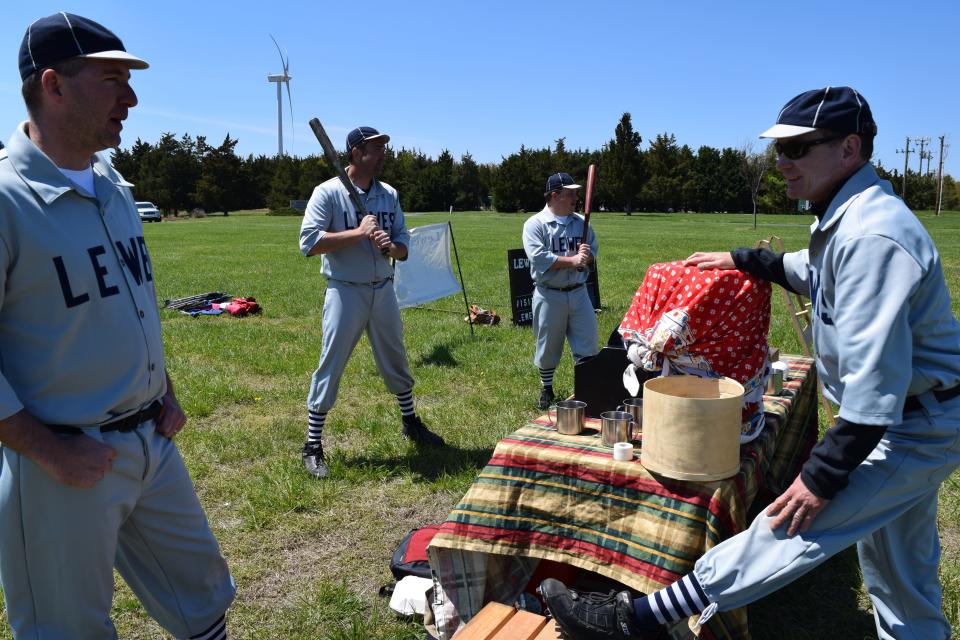How 'intelligent game' of baseball led to a murder in Lewes
- Oops!Something went wrong.Please try again later.
“The editor of the Brooklyn Eagle,” the Delaware State Journal and Statesman noted on Nov. 3, 1865, “gives an amusing description of the game of Base Ball.”
At the time, baseball was still in its infancy, and the Delaware paper was printing the description for, “the edification of such of our readers as have never had an opportunity to see it played.” The account continued, “The game is a great invention. It is easily understood. All you have to do is to — keep your eye on the ball. It is all about the ball.”
Besides the ball, the game involved a bat, which the newspaper called a “club.” “One fellow takes a club, and stands on a line and another stands in front of him, and fires the ball at him. The chap with the club hits back. The ball flies in the other direction.
"The first fellow drops the club as though he was scared, and runs like a pickpocket with [the police] after him. Several fellows run after the ball; some boy catches it and fires at somebody else, when the chap who had the club stops running.”
Although it may not have been apparent from the description, the newspaper concluded that baseball, “is quite an intelligent game.”
Who invented baseball? Not Abner Doubleday
Baseball originated in the decades before the Civil War, when the game was played in several East Coast cities. The claim that Abner Doubleday devised the rules of baseball is a myth, with no foundation in fact. At the time of the Civil War, the game was still evolving, and some aspects of the game were rougher than its modern counterpart.

In the mid-19th century, some clubs played a “Massachusetts” version of the game that allowed runners between bases to be put out by hitting them with the ball. Other teams used the “New York” rules that did not allow for “plunking” base runners.
In the years following the Civil War, baseball rules became unified, plunking runners between bases was outlawed and the more genteel version of the game spread to many Sussex County towns, such as Lewes, Seaford and Laurel.
Unity Square gets completion date: When will downtown Salisbury's Unity Square be completed? Yes, the end is in sight.
Some of the players, however, had rough and tumble attitudes, and mixed with the fierce rivalry between teams, that sometimes led to trouble.
After an omission from one baseball team, a tragic incident ensues
Fistfights between teams were not uncommon, and in 1883, a brawl erupted between the players of the Seaford and Milford teams.
According to the Wilmington Daily Republican, “During the fracas, a young man named Alonzo Morris, of the Milford club had a number of his teeth knocked out.” The most tragic incident, however, involved Ebe Lynch, Lewes postmaster, fire chief, and prominent politician. In 1916, Lynch operated the Zwaanendael restaurant and ice cream parlor on Second Street.
On the evening of July 18, Lynch’s eatery was crowded, and many people were talking about the new baseball team, when Lewes dentist, Dr. William W. Parker, entered the restaurant. Parker was angry that the leaders, including Lynch, of the Lewes baseball team, had denied one of Parker’s relatives a position on the team. After a noisy altercation. Lynch tossed Parker out of the restaurant.

Parker retreated to his nearby home, picked up a shotgun and headed for Lynch’s restaurant. Lynch was standing in front of his establishment when Parker reappeared at the corner of Second and Market streets. Parker lifted the shotgun and fired a single blast into the face and neck of Lynch, who died within minutes.
Entertainment slate at beaches: Country and disco together same event? Yes, find out where it's happening in Dewey Beach
Parker was arrested for murder, and taken to the Georgetown jail, where the dentist developed appendicitis that led to peritonitis. Two weeks later, Parker died. A dispute about baseball, a supposedly “intelligent game,” led to the murder of Ebe Lynch, a respected member of the community, on the streets of Lewes.
Principal sources
Delaware State Journal and Statesman, Nov. 3, 1865.
Daily Republican, Oct. 9, 1883.
Smyrna Times, July 26, 1916.
Evening Journal, July 19, 1916.
Newark Post, Aug. 9, 1916.
Harold Peterson, The Man Who Invented Baseball, New York: Charles Scribner’s Sons, 1973, pp. pp. 4-5.
This article originally appeared on Salisbury Daily Times: Not quite 'intelligent game': Baseball dispute led to murder in Lewes

